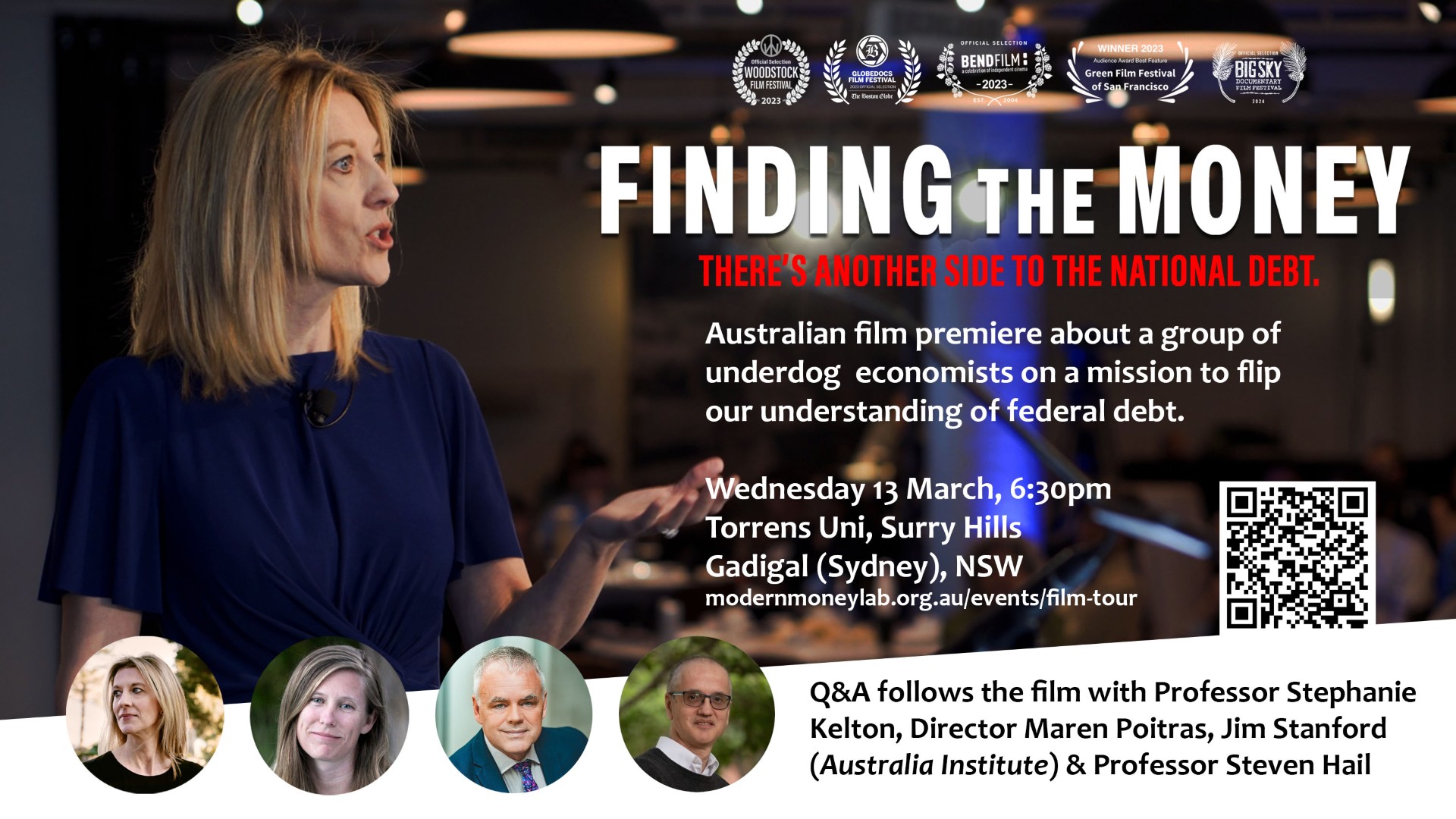On Wednesday 13th of March, I was invited to see Stephanie Kelton present her new documentary called Finding the Money. Stephanie Kelton was a former advisor to Bernie Sanders during the 2016 election, and she is currently a leading proponent of an economic idea called Modern Monetary Theory, which is what the documentary was about.
If you asked me a few years back why I should care about hot new economic theories, I would have said:
“Cool, I’m sure the government will do stuff to improve things for people, so I don’t feel that I need to be bothered to know more about it. Do leave me be as I’m looking forward to going home and playing some video games.”
Do you think that a few years later I would come to see this prediction (about the government improving things) as right? I’m not sure – like what does ‘improving things’ even mean? Nevertheless, let’s look at three ‘things’ that are generally good for governments to ‘improve’:
-Actions to reduce Global Warming
-Ensuring equal opportunity and economic equity
-Social equity and fair treatment & opportunity
2/3 of those are vaguely similar, so it’s very hard to talk about ‘things’ that need ‘improving’ without getting hideously detailed expositions that fog the mind.
Some measuring of Australia’s wealth inequality – i.e. the inequality in assets that are owned between people – suggests that Australia’s wealth inequality has increased over the past 40 years and has returned to a level of inequality similar to that of the 1950s, in the aftermath of WWII.1 In hindsight, my proposition that ‘the government will do stuff to improve things’ sounds too optimistic.
The topic of Australian supermarkets is relevant here. Analysis says that the price of groceries has increased above inflation,2 and then when measured against the fact that Coles’ profit margins have gone up in the past few years,3 and then also against the ~$3,300,000 salary of the Coles CEO,4 then one can view Coles as an enterprise that’s becoming less like a business that’s in the interest of consumers . . .
The Green New Deal is a set of proposals made to encourage governments to address Global Warming, wealth inequality, and other social equities. The European Council has supported its own European Green Deal, while a Green New Deal in America and Australia – via the Australian Greens party – have been merely proposed.
In 2022, Australia produced ~465,900,000,000 Kg of greenhouse gasses,5 while according to the latest Intergovernmental Panel on Climate Change (IPCC) report “significant gains across a range of targets are still necessary.”6
For over 50 years U.S. politicians have referred to their national debt as an obstacle to increasing government spending on public resources. The national debt is a sum of what the government owes to its own treasury, in other words it signifies what the government has spent on the nation without receiving that money back – presumably via taxes etc.
Kelton’s documentary, Finding the Money, repeatedly prefaces that governments print money so that it can be traded, and so an economy can function. In-turn, what Modern Monetary Theory suggests is that national debt is a marker of the amount of money that the government has printed to keep its economy growing and afloat. Of course, the government cannot print infinite money since that would mean everyone has too much money and then prices for consumer goods would inflate into the sky. However, if national debt instead signifies the amount of money that has been turned into national resources, then national debt does not become a barrier to government spending on programs such as a Green New Deal.
Finding the Money addresses the problem of government spending and inflation by showing that inflation can be overcome when the government is able to fine-tune where the money goes so that the clogged pipelines of cash flow – which lead to inflation – can become unclogged via government intervention. Here, ‘government intervention’ would probably look like:
“macroeconomic programs that directly manage the labor force, pricing mechanisms, and investment projects, and [constant monitoring of] financial developments . . . [Promoting] capital controls for open economies, credit controls, and socialization of investment. Wage rates and interest rate management are also important.”7
Warren Coates of CATO Institute – which is a U.S. libertarian think tank – says that:
“The programs favored by MMT, such as government guaranteed employment, must be evaluated on their merits in the traditional way. As an aside, I see many potential problems with a government guarantee of employment and would prefer a guaranteed minimum income, which would provide a comprehensive safety net and leave job and other choices to individuals rather than to government administrators of a jobs program.”8
Coates suggests that too much government intervention will limit the freedom of individuals. When I think back to myself a few years back, when I was fat, addicted to videogames, marijuana, hopelessly unable to control my tendency to endlessly scroll through and watch mind-numbing videos on YouTube, I would have gladly accepted some intervention against my own freedom.
References:
- https://www.afr.com/politics/federal/australia-s-wealth-gap-on-the-rise-with-inequality-worst-since-1950-20230428-p5d41b
- https://www.abc.net.au/news/2023-05-23/supermarket-prices-increase-coles-woolworths-inflation/102380456
- https://www.theguardian.com/business/2024/jan/13/supermarket-price-gouging-claims-inquiry-woolworths-coles-prices
- https://simplywall.st/stocks/au/consumer-retailing/chia-col/coles-group-shares/management#:~:text=Coles%20Group’s%20CEO%20is%20Leah,shares%2C%20worth%20A%245.55M.
- https://www.dcceew.gov.au/about/news/greenhouse-gas-emissions-march-update-2023
- https://report.ipcc.ch/ar6/wg2/IPCC_AR6_WGII_FullReport.pdf
- https://www.levyinstitute.org/pubs/wp_778.pdf
- https://www.cato.org/cato-journal/fall-2019/modern-monetary-theory-critique#the-bottom-line




